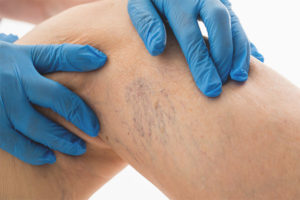The content of the article
The thyroid gland is a small organ in the human body that is responsible for metabolism, produces hormones, and is also involved in many other important processes. The endocrine gland is located on the neck in front of the trachea and under the larynx, consists of two lobules and an isthmus between them. The thyroid gland is more than half composed of iodine. That is why this body suffers the most with iodine deficiency. But how to recognize thyroid problems? Of course, only a doctor can diagnose. However, go to the doctor, if something is wrong with the body, it is up to you. How to understand when to consult an endocrinologist, because the thyroid gland, as a rule, does not hurt and does not bother? Some features of your body can tell you about thyroid problems right now.
Symptoms of thyroid disease
Here are some symptoms that indicate abnormalities in the endocrine gland.
- If the thyroid gland does not produce enough hormones, a person can feel constant fatigue, even after a night's sleep. The muscles are sluggish, the patient constantly wants to sleep, quickly gets tired.
- Sudden weight changes can tell you about thyroid problems. If you have not changed the usual rules of nutrition, and kilograms grow by leaps and bounds, you probably have a malfunction in the endocrine system. This is due to the fact that the thyroid gland, which is responsible for metabolic processes, does not work intensively enough, hence the decrease in metabolic rate. Do not delay the trip to the doctor if the weight, despite exercise and diet, is standing or growing.
- Small reproduction of hormones leads to the fact that a person does not receive enough serotonin - the hormone of joy and pleasure. That is why patients with thyroid problems have apathy, nervousness, bad mood, tearfulness, depression, depression. Moreover, with increased activity of the thyroid gland, a person becomes aggressive, nervous and sharp. And with a low, on the contrary, apathetic and drowsy. Also, the patient's attention concentration decreases, intellectual indicators and memory deteriorate.
- Increased appetite can also indicate malfunctions in the thyroid gland. But sometimes a person does not grow fat, even if he eats a lot. On the contrary, against the background of a large amount of food eaten, it can be very thin and emaciated.
- Patients with endocrine diseases often freeze even at the optimum temperature.
- If iodine deficiency is severe, the endocrine gland increases so much that it can be felt. Often, she squeezes neighboring organs. At the same time, a person may feel a “lump in the throat”, pain, soreness, discomfort when swallowing, and a change in the timbre of the voice. If this is not accompanied by colds, be sure to consult a doctor.
- An advanced degree of disease leads to infertility. With a violation of the endocrine gland in women, menstrual bleeding disappears, men suffer from impotence.
- Serious malfunctions in the endocrine gland are indicated by dry skin, hair loss, bulging eyes, occasional flashing of eyelashes, constipation, muscle and joint pain, prolonged temperature increase by insignificant indicators (36.8-37.8).
If you notice at least a few of these symptoms, you should definitely consult a doctor. In the meantime, you can diagnose the thyroid gland yourself.
How to check thyroid gland
Here are some effective ways to help you test how this vital organ works at home.
- Iodine. This method will help you understand how much your body needs iodine. Make an iodine net on your wrist and leave it for a couple of hours. If during this time the pattern becomes almost invisible, then the skin has absorbed the missing element. You can do the same, draw three strips on the inside of the forearm - thin, medium thickness (2-3 mm) and a centimeter thick. If in the morning there will be only two lanes, and the most subtle will be invisible - everything is in order. If there is only a thick one left - cause for concern. And if the three bands are almost completely erased, be sure to see a doctor.
- Water and a mirror. You can check the size of the thyroid gland with water and a mirror. Stand in front of the mirror and start drinking water. With this look, observe the neck area. Normally, the Adam's apple moves smoothly, without sudden jumps. If between the throat and the dimple in the middle of the neck a tubercle appears (on one side or symmetrical) - the thyroid gland is enlarged.
- Palpation. Stand in front of a mirror and swallow saliva. Keep your fingers at the bottom of your throat. If a swelling or lump is palpated during swallowing, then the gland is enlarged. Sometimes the thyroid gland can even be painful. On palpation, the enlarged organ can move. Doctors with experience accurately determine the norm or pathological size of the thyroid gland. For a person who is far from medicine, this method may seem strange and uninformative. But for your own health it’s worth a try.
- Pencil. As noted, thyroid dysfunction leads to hair loss. However, if hair loss from the head can be for various reasons, then the eyebrows suffer only due to the thyroid gland. Thinning of eyebrows, deterioration in the quality of hairs are signs of a violation in the endocrine system. You can check this with a pencil. Place a pencil to the corner of the eye parallel to the nose. If the corner of the eyebrow looks out over the pencil - everything is fine. If not, the iron is most likely out of order.
- Tie. This method is only suitable for men who are accustomed to wearing a tie and a shirt fastened with all buttons. If suddenly the usual size of the tie and collar of the shirt began to squeeze the neck and bring discomfort, it is safe to say that the thyroid gland is enlarged.
These simple methods will help you make an initial diagnosis and see if you need to see a doctor.
Why does the thyroid gland fail?
Often, genetically predisposed people are prone to violations in the endocrine system. If your close relatives have problems with the thyroid gland, you need to be more attentive to your body and regularly visit an endocrinologist for prevention.
Often, the level of sex hormones affects the functioning of the thyroid gland. An important factor is stress, nervous shocks, depression, emotional imbalance. If your work is associated with frequent overvoltages (both physical and nervous), this can also lead to a malfunction in the endocrine system. The thyroid gland also changes in size after radiation.
Thyroid enlarged, what to do
If you have an enlarged thyroid gland, you should first contact your endocrinologist. After examination, if necessary, he will prescribe a number of diagnostic measures. This is an analysis of some hormones, ultrasound of the thyroid gland, a general blood test, and blood cholesterol. Only after a comprehensive examination, the causes of certain changes are clarified, the diagnosis is made.
Treatment of thyroid diseases is often the intake of those hormones whose production has slowed down. It is very important to choose the optimal dose. Often, hormonal drugs are drunk in courses according to the scheme. In addition, with iodine deficiency, you need to eat foods that are enriched with this trace element. These are seafood, sea and cauliflower, buckwheat, millet, potatoes, beets, carrots, tomatoes, different nuts, persimmons, plums, apples, grapes, natural dairy products - eggs, cottage cheese, cheese, milk.
Often, diseases of the endocrine system are diagnosed in obese people with overweight. Excess weight makes it difficult to deal with the problem. Therefore, you need to monitor nutrition, move more, drink clean water. All this in combination with competent treatment will give results and the disease, along with the extra pounds, will finally dissolve. Be attentive to yourself and your body in order to recognize the problem in time!
Video: how to recognize thyroid problems











Submit